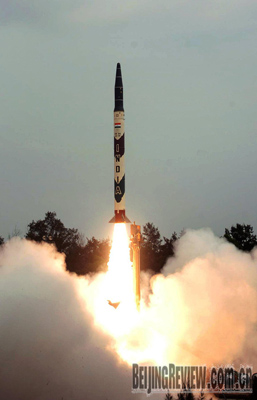|

BLASTING OFF: India successfully tests a medium-range, nuclear-capable
Agni-I missile on March 23. Defense analysts say the missile system is a
major step in India’s nuclear deterrence program.
forgiveness for the nuclear weapon tests India conducted in 1998, which at the time were mostly condemned by the international community. It shows that, when a gigantic and growing economy defies the world and demonstrates its nuclear abilities, economic might wins out in the end.
Divided response
The U.S.-India deal raised international misgivings since India has shunned the NPT, which is meant to stop the spread and production of nuclear weapons and mandates gradual disarmament. Furthermore, India has not committed itself to joining the NPT or a companion agreement, the Comprehensive Test Ban Treaty. While the United States, Russia and France supported lifting the nuclear trade ban, others such as Norway, Ireland, New Zealand, Switzerland, the Netherlands and Austria were hesitant. They insisted that the decision include strong wording to ensure that India would not test nuclear weapons again. Under heavy U.S. pressure, however, they agreed to the use of watered-down language.
Pakistan, India's neighbor and rival, clearly has reason to worry. A Pakistani army statement in August said the U.S.-India nuclear agreement would have negative implications for South Asia's strategic stability, as it would enable India to produce significant quantities of fissile material for nuclear weapons. Regional stability and the global non-proliferation regime would have been better served, the statement said, if the United States had considered a package approach for both India and Pakistan, which conducted its first nuclear weapon tests two weeks after India.
China, which has been trying to improve its relations with India, takes a cautious attitude toward the NSG's decision. While reaffirming its pledge to cooperate with all parties on the peaceful use of nuclear power in accordance with its international obligations and on the basis of equality and mutual benefit, China believes that all countries are entitled to make peaceful use of nuclear energy. Meanwhile, relevant cooperation should be conducive to safeguarding the integrity and efficacy of the international non-proliferation regime.
|
